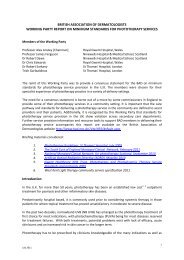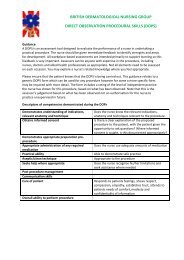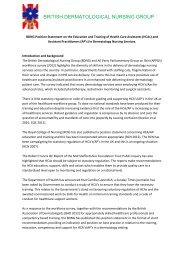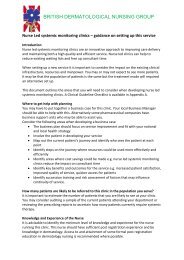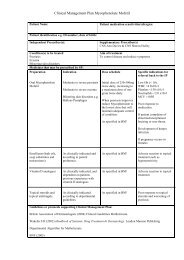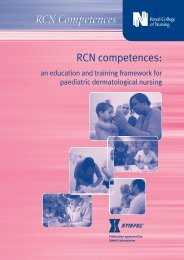Improving outcomes for people with skin tumours including melanoma
Improving outcomes for people with skin tumours including melanoma
Improving outcomes for people with skin tumours including melanoma
You also want an ePaper? Increase the reach of your titles
YUMPU automatically turns print PDFs into web optimized ePapers that Google loves.
<strong>Improving</strong> Outcomes <strong>for</strong><br />
People <strong>with</strong> Skin Tumours<br />
<strong>including</strong> Melanoma<br />
Follow-up<br />
Follow-up<br />
Introduction<br />
This chapter deals <strong>with</strong> follow-up of the majority of patients <strong>with</strong> <strong>skin</strong><br />
cancer who do not fall into the groups cited in the ‘Management of<br />
special groups’ chapter who may have more intensive follow-up<br />
needs.<br />
5<br />
This chapter does not deal <strong>with</strong> follow-up of patients <strong>with</strong><br />
precancerous lesions, because once the diagnosis and education have<br />
been given to the patient, no further follow-up is indicated. Following<br />
consultation, some patients <strong>with</strong> multiple lesions and those <strong>with</strong><br />
continually developing lesions may need longer-term follow-up, and<br />
this should be at the discretion of the doctor in charge of the<br />
management of the patient. Follow-up of these patients may not<br />
necessarily have to be made in a local hospital, and arrangements will<br />
depend on local circumstances and patient choice.<br />
Although a large proportion of patients report that they value followup,<br />
it does cause anxiety in many, and some patients find that<br />
attending <strong>for</strong> follow-up makes it difficult <strong>for</strong> them to return to ‘normal<br />
life’. These patients may prefer not to attend but currently feel that<br />
they do not have this choice. Options and decisions regarding followup<br />
should be agreed jointly <strong>with</strong> the patient.<br />
The importance of follow-up varies across <strong>skin</strong> cancer types,<br />
depending on the risk of recurrence, the efficacy of intervention in<br />
recurrent disease, the risk of development of metachronous (new<br />
primary) disease and the methods <strong>for</strong> detecting this. Follow-up by<br />
doctors or nurses is only of benefit if it leads to detection of recurrent<br />
or new disease at a point in time when intervention is more likely to<br />
be effective than when patients present, having become aware of the<br />
problem themselves. In <strong>skin</strong> cancers <strong>with</strong> a low risk of mortality or<br />
recurrence (e.g. low-risk BCCs), long-term follow-up is not costeffective.<br />
The net benefit <strong>for</strong> patients in terms of reassurance is poorly<br />
understood.<br />
102<br />
National Institute <strong>for</strong> Health and Clinical Excellence




